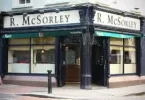Buying a pub from Receivership
A number of licensed premises have gone into Receivership over the last few years and as the economy begins to pick up, some are now selling on the open market.
While many Receivership sales are understandably a cause for controversy in the licensed trade, the phrase ‘Caveat Emptor’ or buyer beware has never been more pertinent to anyone purchasing from the Receiver.
One publican, who wishes to remain anonymous, can testify to that after purchasing a public house from Receivership.
Now busy ‘doing it up’, he spoke to Drinks Industry Ireland about what he’s learned from purchasing from the Receiver.
For one thing, the amount of work that had to be carried out to bring the premises back to an acceptable standard was a fiscal and time-consuming cross that he’d to bear for many months after the deal went through.
As a result of this and other tribulations that came his way post-purchase, he can offer prospective purchasers a number of tips should they be thinking of buying a pub from the Receiver.
Because according to one company, expert in the sale of pubs, “Often there may be ‘gaps’ in the information that’s on file versus documentation that may be required by an intending purchaser.
“The original solicitor for the owner would be best-placed to answer these questions, however, taking into consideration the status of conflict of interest, the Receiver may not be in a position to answer all of the questions and/or furnish all documentation as requested by an intending purchaser (Third Party).
“The Receiver, usually issues what is often referred to as a ‘standard Receivers Contract’ where no warranties and requisitions (questions) will be entertained by the Receiver if the Receiver does not have the information to furnish to a third party.”
Legal costs can be higher than you’d think
In his own case, our purchasing publican had to deal with quite a number of different solicitors representing the Receiver, the bank selling the pub, the bank offering him the loan to buy the pub and his own solicitor.
Unintended expense of incidentals
Equipment
Just because equipment such as dishwashers and ice machines are listed on the inventory, it doesn’t mean that they’re in working order.
Not only that, but some of the items of equipment sold on to him as purchaser were not listed as having been leased or having belonged to a third party. He insisted on keeping them as they were part of the sale of ‘fixtures and fittings’.
What you bought but didn’t want
After taking over the pub our publican found old ashtrays, lots of ancient POS material and out-of-date branded glasses going back to the 70s as well as other assorted useless paraphernalia which filled five skips before he could begin renovations.
“Make sure you make allowances for getting rid of stuff that’s no use to you such as broken equipment and old bar stools etc,” he advises.
And with little or no money having been spent on the pub prior to or during Receivership he found himself having to look after two years’-worth of outstanding items sorely in need of update.
“A ‘cheap’ pub might not be so cheap by the time you finish with it,” he remarks.

As far as possible, try to check the status of any services that you expect to take up or continue with in the pub once purchased.
What you didn’t realise you’d bought
As far as possible, try to check the status of any services that you expect to take up or continue with in the pub once purchased.
For, as our expert auctioneer points out, “All outgoings to do with the property including commercial taxes, water charges, rates etc are the liability of the vendor in any instance up until the date of closing of the sale and are the liability of the purchaser only from the date of purchase and not prior.
“With regards to contracts to third party suppliers such as Sky Sports etc, we understand these liabilities usually typically rest with the vendor-receiver or private sale”.
But what about local council business rates arrears?
Some good news here: under the Local Government Reform Act of 2014, the liability of the new owner for outstanding rates has been rescinded.
Do Due Dilligence – it pays!
“Due Dilligence – an awfully small word for an awful lot of work” is how our publican describes the exercise of Due Dilligence in purchasing a pub.
For example he had to ensure that all staff being taken on had their holiday pay and pension entitlements up-to-date.
“One must also pay particular attention to the Transfer of Undertakings (Protection of Employment) Regulations which safeguard the rights of employees where the business in which they’re employed is transferred to a new owner,” he adds.
(It’s worth bearing in mind too that the valuation put on the contents of the pub needs to be subtracted from the overall sale price to avoid overpayment of Stamp Duty.)
It’s also down to the purchaser to personally ensure that readings are taken of all electricity and gas meters etc on the day the sale closes.
In addition to this, our publican had to ensure that all credit card machines were updated with the new owner’s details. Otherwise, a happy Receiver would continue to get the proceeds of these credit card sales subsequent to the purchase.
The stock does not form part of the overall sale nor does it come under ‘fixtures and fittings’ and must be purchased as a separate entity. Normally there will be two stock-takers in attendance (theirs and yours) so that a price can be negotiated for the outstanding stock.
By this means, all out-of-date stock is eliminated from the stock purchase.
Don’t pass over passwords
Then there are all those ‘obvious’ things one might never consider such as passwords for the pub’s twitter and facebook accounts, those for the computers in the office and those for the security alarms as well as taking the trouble to ensure that the former keyholder’s number is changed.
Our publican well recalls being woken from his slumbers early one morning recently by the phone ringing beside his bed.
It was his old pub’s security company who still had his name down as the keyholder. The new owners hadn’t changed the first responder list.
Opening & closing accounts with suppliers
Problems can arise too with suppliers. Some insist that you must open a new account with them before they can supply you with product even if you’ve been their customer for decades.
In this case, when the publican sold his own pub, a month’s extension to the closing date for the sale of his pub became necessary and it engendered all sorts of problems with keeping on staff and keeping up supply. As a result some suppliers requested that he undertake a new contract with them for the 30-day period of the extension.
The new contract required 30 pages of time-consuming form-filling – and all the hoops had to be jumped through yet again when he moved into his new pub.
“Even ‘though you’ve been in the business a long time suppliers insist on opening a new account with the new pub as your old contract or even familiarity with the customer counts for nothing in today’s business climate,” he says, “Some of the necessary forms run to 30 pages and they must be solicitor-witnessed and accompanied by personal guarantees and an undertaking from the solicitor that you’re the legal owner!”
Expect the unexpected!
There can be so many services attached to a pub that it’s simply not possible to think of them all.
In the time I spent sitting with the new owner over the course of two hours he was visited by the pub’s pest control agent who claimed a contract with the pub for the remainder of the year (of which the publican was unaware) and a tobacco salesman enquired about the machines in his pub.
“Word gets around the supply and services trade very quickly when a pub has been purchased,” observes our publican.
Add to the above those who assume that they continue have the account for the garbage collection, the vending machines, the fire alarms maintenance, the security alarms maintenance etc…. and sometimes the proud new publican can get to feeling that he’s under siege!
“And when it’s all over and you’re the proud owner of a new pub – having been put through Hell by the banks – don’t forget those same banks will then be seeking their own ‘arrangement fee’ for the privilege of having put you through it,” smiles our publican, without a hint of humour.
Buyer beware
So just how true is it that Receivers don’t give much information away – and aren’t required to – when selling a pub?
“The attitude of many seems to be ‘Here’s the pub, take it or leave it’,” says our publican.
David L’Estrange, accountant to the licensed trade and a publican himself agrees and has his own colourfully jaundiced view of the perils of dealing with a Receiver.
“If a Receiver is in the same room as you and he looks out the window and tells you that it’s raining outside” he says, “you want to go out and check that it’s actually raining outside yourself and not discover a man with a watering can above your window….”
Quite.
To be fair, though, he also blamed the banks for the Receivers’ present situation.
“They will not give the Receivers any warranty on a pub,” he says, “Insurance is not available to cover Receivers.
“We need to be more open in Receiverships so that people can see what they’re getting and be entitled to a standard form of comeback.”
As in all transactions then, in the final analysis it’s the experience of the publican himself that plays the most important part in purchasing a pub from the Receiver and knowing what to look out for.
After that, everything else is just poker.

Problems can arise too with suppliers. Some insist that you must open a new account with them before they can supply you with product even if you’ve been their customer for decades.








